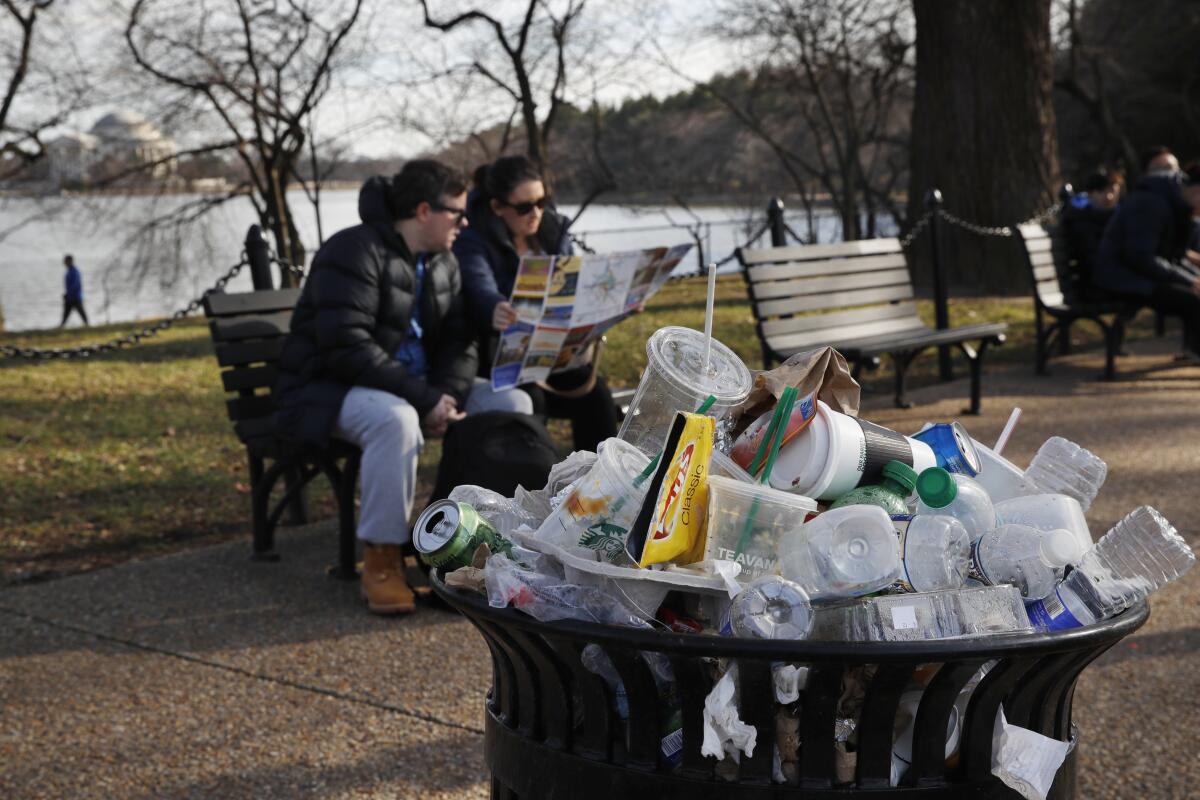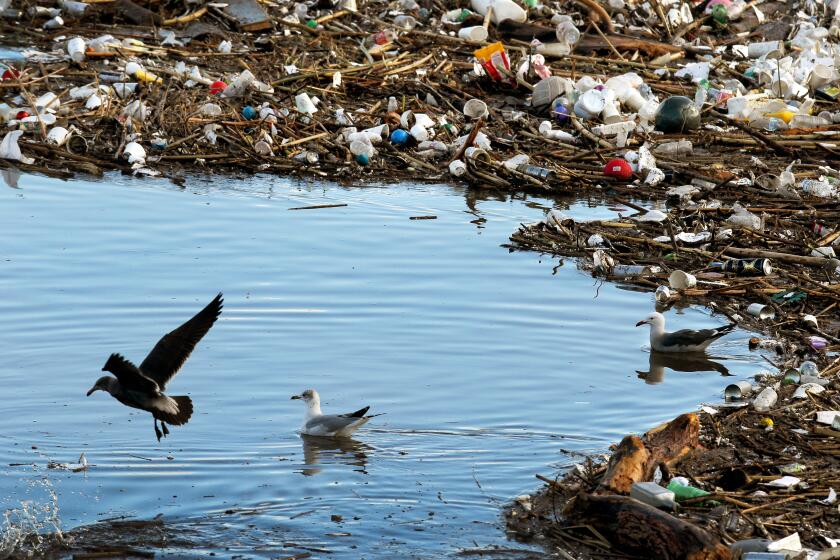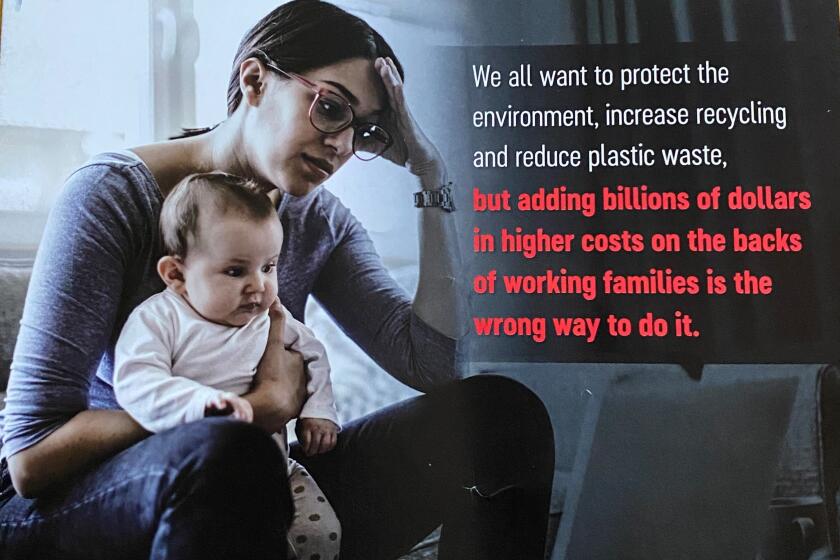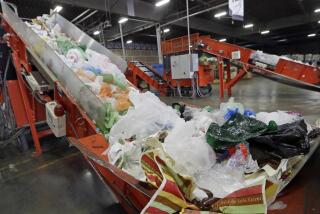Newsom signs nation’s most sweeping law to phase out single-use plastics and packaging waste

- Share via
SACRAMENTO — Striking a blow against a pernicious form of pollution, Gov. Gavin Newsom signed into law Thursday the nation’s most far-reaching restrictions on single-use plastics and packaging.
The legislation heads off a November ballot measure that many lawmakers and the plastics industry hoped to avoid, and it puts California at the forefront of national efforts to eliminate polystyrene and other plastics that litter the environment, degrade into toxic particles and increasingly inhabit human blood, tissue and organs.
Sen. Ben Allen (D-Santa Monica) had tried for years to get state legislators to tackle the growing plastic pollution crisis but has faced opposition from the plastics industry, some food container manufacturers and environmentalists who believe the law doesn’t go far enough.
“Relief,” was how he described his emotional state after the legislation was signed. “It’s been a long journey.”
The California Senate approved the bill Thursday morning with 29 ayes and zero “nos,” after the Assembly passed it 67 to 2 late Wednesday. Backers in both houses applauded the bill’s historic nature and bipartisan support, as did Newsom.
“Our kids deserve a future free of plastic waste and all its dangerous impacts,” said the governor in a statement. “Everything from clogging our oceans to killing animals — contaminating the air we breathe, the water we drink, and the food we eat. No more.”
“With this legislation, California continues its tradition of global environmental leadership,” Allen added. The new law, he said, would “grow markets, create incentives for investment, and give tools to other states and countries to help play their part in this fight.”
For the past six months, a team of roughly two dozen negotiators — mostly women — hammered out language designed to reduce plastic, increase recycling and shift the economic burden of waste disposal to plastic producers and packagers. They also sought to find language that would satisfy those producers, as well as waste managers, packaging companies and environmentalists.
As recently as two weeks ago, environmental leaders were divided on amendments to Allen’s bill, with backers of the ballot measure claiming his bill gave away too much to industry. But following more talks and revisions, initiative backers have since come behind the legislation and agreed to drop their ballot plans.
Environmentalists and industry are at odds over a November ballot initiative that would reduce single-use plastics and polystyrene food containers.
At the Capitol on Thursday, the atmosphere was festive, as environmentalists congregated on the building’s steps with a giant, inflatable turtle. They held signs showing support for the bill, while they danced and shuffled to the Beach Boys’ “Surfin USA.”
The bill requires that by Jan. 1, 2028, at least 30% of plastic items sold, distributed or imported into the state be recyclable. By 2032, that number rises to 65%. It also calls for a 25% reduction in single-use plastic waste by 2032 and provides CalRecycle with the authority to increase that percentage if the amount of plastic in the economy and waste stream grows.
In the case of expanded polystyrene, that number needs to reach 25% by 2025. If the number isn’t hit, the ubiquitous, hard-to-recycle foamy plastic will be banned.
Some 128 California cities already have bans on polystyrene.
“It’s a de facto ban,” said Jay Ziegler with the Nature Conservancy, of the bill’s polystyrene recycling requirement. He added that current recycling rates for polystyrene are in the low single digits, making it improbable that a 25% recycling target could be met in three years.
Plastics waste has become an increasing scourge nationwide as plastics packaging has become ubiquitous in groceries, fast-food outlets and other businesses, and consumers — especially during the pandemic — have embraced take-out items delivered in single-use containers. The resulting waste pollutes marine environments and clogs landfills, in part because of challenges in recycling plastics, including China’s decision to end imports of plastics waste several years ago.
The bill is based on a policy concept known as Extended Producer Responsibility, which shifts the responsibility of waste from consumers, towns and cities to companies manufacturing products with environmental impacts. . It also gives plastics companies extensive oversight and authority in terms of the program’s management, execution and reporting, via a Producer Responsibility Organization, which will be made up of industry representatives.
Among various duties, the group will be responsible for collecting fees from its participating organizations to pay for the program, as well as an annual $500-million fee that will be directed to plastic pollution mitigation fund.
CalRecycle has ultimate authority over the program.
Negotiators, including Heidi Sanborn, founder of the National Stewardship Action Council, said past failures in Extended Producer Responsibility laws influenced how this legislation was written, enabling the authors to identify areas that could be abused or ignored.
In 2010, the state created a similar producer responsibility law mandating carpet recycling. Overseen by the industry, the target was 24% recycling by 2020. Recycling rates decreased after the program was instituted. CalRecycle sued the group for $3.3 million in 2017 for failing to meet its target, and in 2021, they settled for $1.175 million.
In another case that involved California’s Paint Care program, the manufacturers ultimately sued the state and used the funding from the program to cover their litigation costs.
Language in this new plastic bill includes clear dates and consequences for failure, including a $50,000-per-day fine on any company or “entity” not in compliance with the law, as well as directions for how collected fees can and cannot be used.
“We’ve learned from mistakes in the past,” said Sanborn. “This legislation is solid.”
Not everyone is happy.
An industry front group, the ‘Environmental Solutions Coalition,’ is sending fliers claiming plastics restrictions will drive up costs.
The American Chemistry Council’s vice president of plastics, Joshua Baca, issued a statement on Wednesday saying that although his organization had worked alongside Allen and the negotiators for months, the final version “is not the optimal legislation to drive California towards a circular economy.”
He said the law’s definition of recycling “needs to be improved and made clearer so new, innovative technologies that keep hard to recycle plastic out of the environment and landfills count in achieving the circularity goals in the legislation.”
Environmental justice groups had expressed concern that the bill left open the opportunity for waste companies to try to recycle plastics by employing polluting methods such as pyrolysis and gasification, which convert plastics into fuel, energy or other forms of plastic.
“The bill, with my committee’s amendments, bans chemical recycling and includes recognition of the protection of disadvantaged and low-income communities,” said Assemblymember Luz Rivas (D-North Hollywood). “I would not let the bill out of my committee if I felt that a chemical recycling plant could be built in my community.”
Other critics say the bill doesn’t explicitly single out plastics but includes language that could pull in other materials such as paper, cardboard and glass.
Materials “that are not tossed out as trash should not be treated as solid waste, and the Legislature must act to eliminate any confusion about that,” said Melinda Andrade, executive director of the Assn. of California Recycling Industries.
Kevin Messner, with the Assn. of Home Appliance Manufacturers, voiced a similar concern. He said the language of the bill, which includes all packaging material, will hurt his clients and create a disincentive for them to use non-plastic materials, which are often heavier, bulkier and more expensive.
But environmentalists, including Anja Brandon with the Ocean Conservancy, said the bill takes an important step toward ensuring all single-use items are recycled.
“We have set up the system so that everyone who creates single use packaging pays, but they pay at a different rate,” she said. “We’re investing in building a recycling infrastructure and getting away from extractive practices that focus on virgin material.”
Nick Lapis of Californians Against Waste said that passage of the bill sets the bar for the rest of the nation. But for it to be successful “it will be incumbent on us and the regulators to keep industry’s feet to the fire,” he said. “We absolutely cannot claim a victory and walk away.”
Lawmakers agreed, with one saying it should have come earlier.
“It’s incomprehensible the level of plastic pollution across the globe and how it’s affecting our water waste and air. ... I just hope we’re not too late, “ said Sen. Nancy Skinner (D-Berkeley).
Rust reported from Menlo Park and Sosa from Sacramento.












